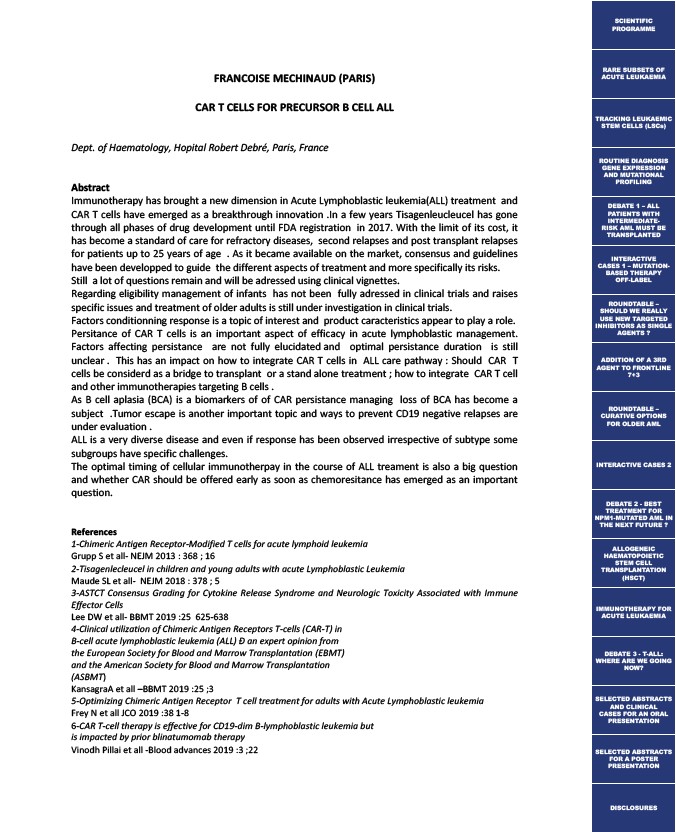
FRANCOISE MECHINAUD (PARIS)
CAR T CELLS FOR PRECURSOR B CELL ALL
Dept. of Haematology, Hopital Robert Debré, Paris, France
Abstract
Immunotherapy has brought a new dimension in Acute Lymphoblastic leukemia(ALL) treatment and
CAR T cells have emerged as a breakthrough innovation .In a few years Tisagenleucleucel has gone
through all phases of drug development until FDA registration in 2017. With the limit of its cost, it
has become a standard of care for refractory diseases, second relapses and post transplant relapses
for patients up to 25 years of age . As it became available on the market, consensus and guidelines
have been developped to guide the different aspects of treatment and more specifically its risks.
Still a lot of questions remain and will be adressed using clinical vignettes.
Regarding eligibility management of infants has not been fully adressed in clinical trials and raises
specific issues and treatment of older adults is still under investigation in clinical trials.
Factors conditionning response is a topic of interest and product caracteristics appear to play a role.
Persitance of CAR T cells is an important aspect of efficacy in acute lymphoblastic management.
Factors affecting persistance are not fully elucidated and optimal persistance duration is still
unclear . This has an impact on how to integrate CAR T cells in ALL care pathway : Should CAR T
cells be considerd as a bridge to transplant or a stand alone treatment ; how to integrate CAR T cell
and other immunotherapies targeting B cells .
As B cell aplasia (BCA) is a biomarkers of of CAR persistance managing loss of BCA has become a
subject .Tumor escape is another important topic and ways to prevent CD19 negative relapses are
under evaluation .
ALL is a very diverse disease and even if response has been observed irrespective of subtype some
subgroups have specific challenges.
The optimal timing of cellular immunotherpay in the course of ALL treament is also a big question
and whether CAR should be offered early as soon as chemoresitance has emerged as an important
question.
References
1-Chimeric Antigen Receptor-Modified T cells for acute lymphoid leukemia
Grupp S et all- NEJM 2013 : 368 ; 16
2-Tisagenlecleucel in children and young adults with acute Lymphoblastic Leukemia
Maude SL et all- NEJM 2018 : 378 ; 5
3-ASTCT Consensus Grading for Cytokine Release Syndrome and Neurologic Toxicity Associated with Immune
Effector Cells
Lee DW et all- BBMT 2019 :25 625-638
4-Clinical utilization of Chimeric Antigen Receptors T-cells (CAR-T) in
B-cell acute lymphoblastic leukemia (ALL) Ð an expert opinion from
the European Society for Blood and Marrow Transplantation (EBMT)
and the American Society for Blood and Marrow Transplantation
(ASBMT)
KansagraA et all –BBMT 2019 :25 ;3
5-Optimizing Chimeric Antigen Receptor T cell treatment for adults with Acute Lymphoblastic leukemia
Frey N et all JCO 2019 :38 1-8
6-CAR T-cell therapy is effective for CD19-dim B-lymphoblastic leukemia but
is impacted by prior blinatumomab therapy
Vinodh Pillai et all -Blood advances 2019 :3 ;22
SCIENTIFIC
PROGRAMME
RARE SUBSETS OF
ACUTE LEUKAEMIA
TRACKING LEUKAEMIC
STEM CELLS (LSCs)
ROUTINE DIAGNOSIS
GENE EXPRESSION
AND MUTATIONAL
PROFILING
DEBATE 1 – ALL
PATIENTS WITH
INTERMEDIATE-RISK
AML MUST BE
TRANSPLANTED
INTERACTIVE
CASES 1 – MUTATION-BASED
THERAPY
OFF-LABEL
ROUNDTABLE –
SHOULD WE REALLY
USE NEW TARGETED
INHIBITORS AS SINGLE
AGENTS ?
ADDITION OF A 3RD
AGENT TO FRONTLINE
7+3
ROUNDTABLE –
CURATIVE OPTIONS
FOR OLDER AML
INTERACTIVE CASES 2
DEBATE 2 - BEST
TREATMENT FOR
NPM1-MUTATED AML IN
THE NEXT FUTURE ?
ALLOGENEIC
HAEMATOPOIETIC
STEM CELL
TRANSPLANTATION
(HSCT)
IMMUNOTHERAPY FOR
ACUTE LEUKAEMIA
DEBATE 3 - T-ALL:
WHERE ARE WE GOING
NOW?
SELECTED ABSTRACTS
AND CLINICAL
CASES FOR AN ORAL
PRESENTATION
SELECTED ABSTRACTS
FOR A POSTER
PRESENTATION
DISCLOSURES